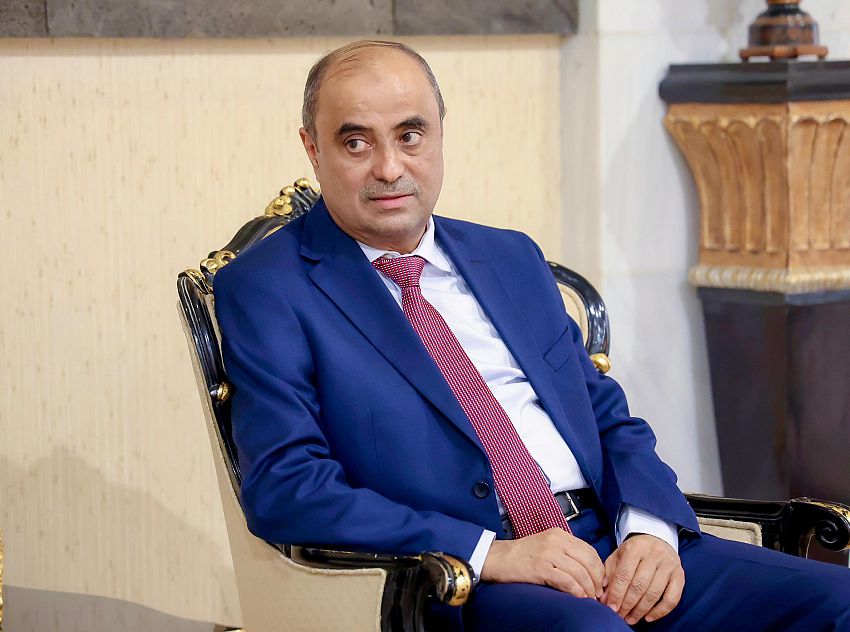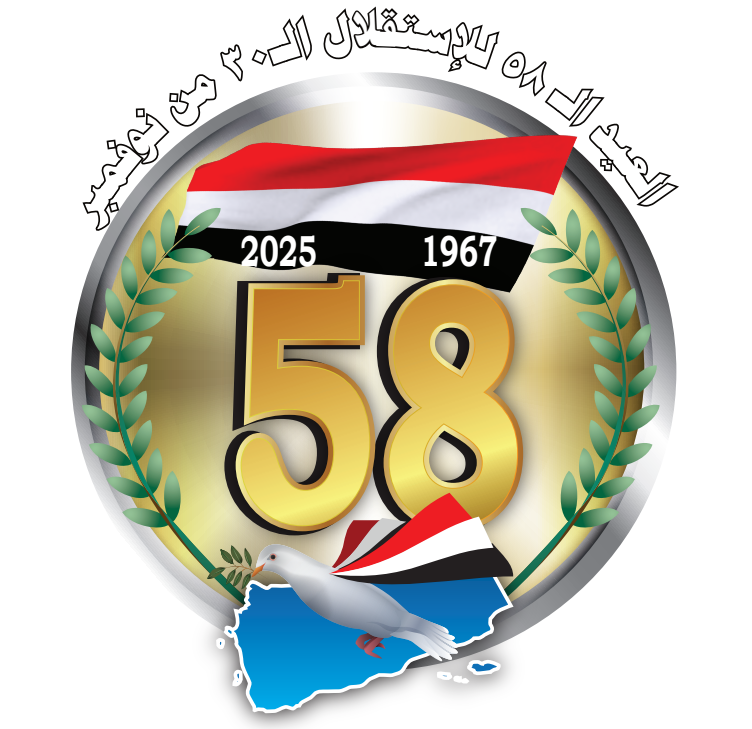
Presidential Decree on Appointments in First Military Region Issued
The Chairman of the Presidential Leadership Council, the Supreme Commander of the Armed Forces issued Wednesday Decree No. (40) of 2026 regarding appointments in the leadership of the First Military Region.

German Chancellor Says Europe Must Stand Strong
German Chancellor Friedrich Merz has called on Europeans to strive for greater autonomy, emphasizing the need for Europe to defend itself using its own capabilities, given the shift in transatlantic relations.

China's foreign exchange reserves rise to $3.3991 trillion
China's total foreign exchange reserves made $3.3991 trillion at the end of last January, marking an increase of $41.2 billion, or 1.23 percent, compared to the end of December last year.

Saudi League: Al-Nassr, Al-Ettifaq and Neom Secure Victories Over Al-Ittihad, Damac and Al-Riyadh
Al-Nassr defeated its guest Al-Ittihad 2–0 in the match that brought them together at Al-Awwal Park Stadium in Riyadh, as part of the 21st round of the Saudi Professional League.
Last Update: ،
2026/02/12
Time
06:53:51
Latest News:
 Presidential Decree Establishes Cardiac and Vascular Center in Taiz
Presidential Decree Establishes Cardiac and Vascular Center in Taiz
 Chief of General Staff Discusses Strengthening Military Cooperation with Saudi Counterpart
Chief of General Staff Discusses Strengthening Military Cooperation with Saudi Counterpart
 Presidential Decree on Establishing Health Fund Issued
Presidential Decree on Establishing Health Fund Issued
 Member of Presidential Leadership Council al-Aradah Meets UN Special Envoy to Yemen
Member of Presidential Leadership Council al-Aradah Meets UN Special Envoy to Yemen
 Presidential Council Member Salim Al-Khanbashi Meets UN Envoy
Presidential Council Member Salim Al-Khanbashi Meets UN Envoy
Latest News:
 Presidential Decree Establishes Cardiac and Vascular Center in Taiz
Presidential Decree Establishes Cardiac and Vascular Center in Taiz
 Chief of General Staff Discusses Strengthening Military Cooperation with Saudi Counterpart
Chief of General Staff Discusses Strengthening Military Cooperation with Saudi Counterpart
 Presidential Decree on Establishing Health Fund Issued
Presidential Decree on Establishing Health Fund Issued
 Member of Presidential Leadership Council al-Aradah Meets UN Special Envoy to Yemen
Member of Presidential Leadership Council al-Aradah Meets UN Special Envoy to Yemen
 Presidential Council Member Salim Al-Khanbashi Meets UN Envoy
Presidential Council Member Salim Al-Khanbashi Meets UN Envoy
PM: Peace strategic choice for government, but there is no reliable partner
[28/09/2025 01:38]
ADEN-SABA
The Prime Minister Salem bin Braik stated that the recent improvement in the exchange rate of the national currency was not a coincidence, but rather the result of the integration of financial and monetary policies adopted by the government in coordination with the Central Bank of Yemen (CBY).
In an interview with the newspaper 'Asharq al-Awsat' published in its issue today, Sunday, he explained that the currency does not improve through slogans, but through difficult decisions and fiscal discipline.
He said "We have succeeded in curbing speculation, regulating the market, efficiently managing limited resources and imposing transparent mechanisms for financing imports."
He went on saying "among the measures taken by the government are the formation of the National Committee for Regulating and Financing Imports, the prohibition of dealing in foreign currencies in the domestic market, rationalizing public spending and enhancing revenues, activating monitoring and transparency tools".
Bin Braik explained that these measures have led to a significant decline in demand for foreign currency and reduced the gaps that were causing the rial to sharply depreciate, stressing that what happened proves that institutional reforms can make a difference even in the absence of primary revenues, referring to the halt in crude oil exports, which represent 65 percent of public revenues.
The Prime Minister underscored the importance of giving the government an opportunity to work with full powers away from obstacles, underlining the importance of the partners' support to strengthen the position of the national currency.
He made it clear that this improvement needs additional structural measures to ensure its sustainability, calling for courageous decisions that match the nature of the challenges.
The status quo is a difficult stage requires the government to fight a parallel battle alongside the battle to restore the state, Bin Braik stressed.
He noted that the most prominent national challenges include the enormous pressure on basic services, weak revenues due to the halt of oil exports, the complexities of managing local resources and the increasingly growing humanitarian needs.
The Prime Minister warned that the Houthi militias are waging a systematic economic war, using the economy as a weapon to weaken the state and exacerbate the humanitarian crisis.
He made it clear that "The situation in Yemen is no longer merely a national crisis but rather it has become part of the international security equation from the Red Sea to global shipping routes".
Regarding the peace process, Bin Braik stressed that peace is a strategic choice for the Yemeni government, but the problem is that there is no serious and responsible partner.
He blamed Houthi militias for blocking peace efforts and proposal throughout the past years.
The Houthis have repeatedly proved that they have never sought to end the conflict and make peace. The international community is very familiar with this, he stated.
Bin Braik blamed the Iranian regime for prolonging the conflict saying the continued flow of weapons and advanced equipment from Tehran to the militias, as revealed by repeated seizures, is a solid evidence that the Houthis and their sponsors have no genuine intention for peace.
The Prime Minister outlined the features of the desired peace through the restoration of the legal system, the extension of state authority over all its territories, adherence to the constitution and national principles and the implementation of the three references, namely the UN Security Council Resolution No. 2216.
The Prime Minister Salem bin Braik stated that the recent improvement in the exchange rate of the national currency was not a coincidence, but rather the result of the integration of financial and monetary policies adopted by the government in coordination with the Central Bank of Yemen (CBY).
In an interview with the newspaper 'Asharq al-Awsat' published in its issue today, Sunday, he explained that the currency does not improve through slogans, but through difficult decisions and fiscal discipline.
He said "We have succeeded in curbing speculation, regulating the market, efficiently managing limited resources and imposing transparent mechanisms for financing imports."
He went on saying "among the measures taken by the government are the formation of the National Committee for Regulating and Financing Imports, the prohibition of dealing in foreign currencies in the domestic market, rationalizing public spending and enhancing revenues, activating monitoring and transparency tools".
Bin Braik explained that these measures have led to a significant decline in demand for foreign currency and reduced the gaps that were causing the rial to sharply depreciate, stressing that what happened proves that institutional reforms can make a difference even in the absence of primary revenues, referring to the halt in crude oil exports, which represent 65 percent of public revenues.
The Prime Minister underscored the importance of giving the government an opportunity to work with full powers away from obstacles, underlining the importance of the partners' support to strengthen the position of the national currency.
He made it clear that this improvement needs additional structural measures to ensure its sustainability, calling for courageous decisions that match the nature of the challenges.
The status quo is a difficult stage requires the government to fight a parallel battle alongside the battle to restore the state, Bin Braik stressed.
He noted that the most prominent national challenges include the enormous pressure on basic services, weak revenues due to the halt of oil exports, the complexities of managing local resources and the increasingly growing humanitarian needs.
The Prime Minister warned that the Houthi militias are waging a systematic economic war, using the economy as a weapon to weaken the state and exacerbate the humanitarian crisis.
He made it clear that "The situation in Yemen is no longer merely a national crisis but rather it has become part of the international security equation from the Red Sea to global shipping routes".
Regarding the peace process, Bin Braik stressed that peace is a strategic choice for the Yemeni government, but the problem is that there is no serious and responsible partner.
He blamed Houthi militias for blocking peace efforts and proposal throughout the past years.
The Houthis have repeatedly proved that they have never sought to end the conflict and make peace. The international community is very familiar with this, he stated.
Bin Braik blamed the Iranian regime for prolonging the conflict saying the continued flow of weapons and advanced equipment from Tehran to the militias, as revealed by repeated seizures, is a solid evidence that the Houthis and their sponsors have no genuine intention for peace.
The Prime Minister outlined the features of the desired peace through the restoration of the legal system, the extension of state authority over all its territories, adherence to the constitution and national principles and the implementation of the three references, namely the UN Security Council Resolution No. 2216.
Key words:
implementation - sustainability - institutional - rationalizing - Regarding - international - transparency - coordination - humanitarian - increasingly - Presidential Decree on Appointments in First Military Region Issued
Presidential Decree on Appointments in First Military Region Issued  Presidential Decree Establishes Cardiac and Vascular Center in Taiz
Presidential Decree Establishes Cardiac and Vascular Center in Taiz Chief of General Staff Discusses Strengthening Military Cooperation with Saudi Counterpart
Chief of General Staff Discusses Strengthening Military Cooperation with Saudi Counterpart Presidential Decree on Establishing Health Fund Issued
Presidential Decree on Establishing Health Fund Issued Presidential Council Member Salim Al-Khanbashi Meets UN Envoy
Presidential Council Member Salim Al-Khanbashi Meets UN Envoy Prime Minister Affirms to “Yemen Partners Group” Government’s Determination to Reorganize the Situation
Prime Minister Affirms to “Yemen Partners Group” Government’s Determination to Reorganize the Situation  President of the Presidential Leadership Council to European Institute of Peace Delegation: Treating the Houthis as a Normal Actor Is a Structural Error That Threatens to Perpetuate War and Suffering
President of the Presidential Leadership Council to European Institute of Peace Delegation: Treating the Houthis as a Normal Actor Is a Structural Error That Threatens to Perpetuate War and Suffering Widespread UN and International Welcome for Formation of New Yemeni Government
Widespread UN and International Welcome for Formation of New Yemeni Government President al-Alimi to European Delegation: Treating Houthis as Normal Actor, Structural Error Threatens Perpetuation of Wars, Suffering
President al-Alimi to European Delegation: Treating Houthis as Normal Actor, Structural Error Threatens Perpetuation of Wars, Suffering Interior Minister Discusses Enhancing Joint Security Cooperation with Saudi Officia
Interior Minister Discusses Enhancing Joint Security Cooperation with Saudi Officia


